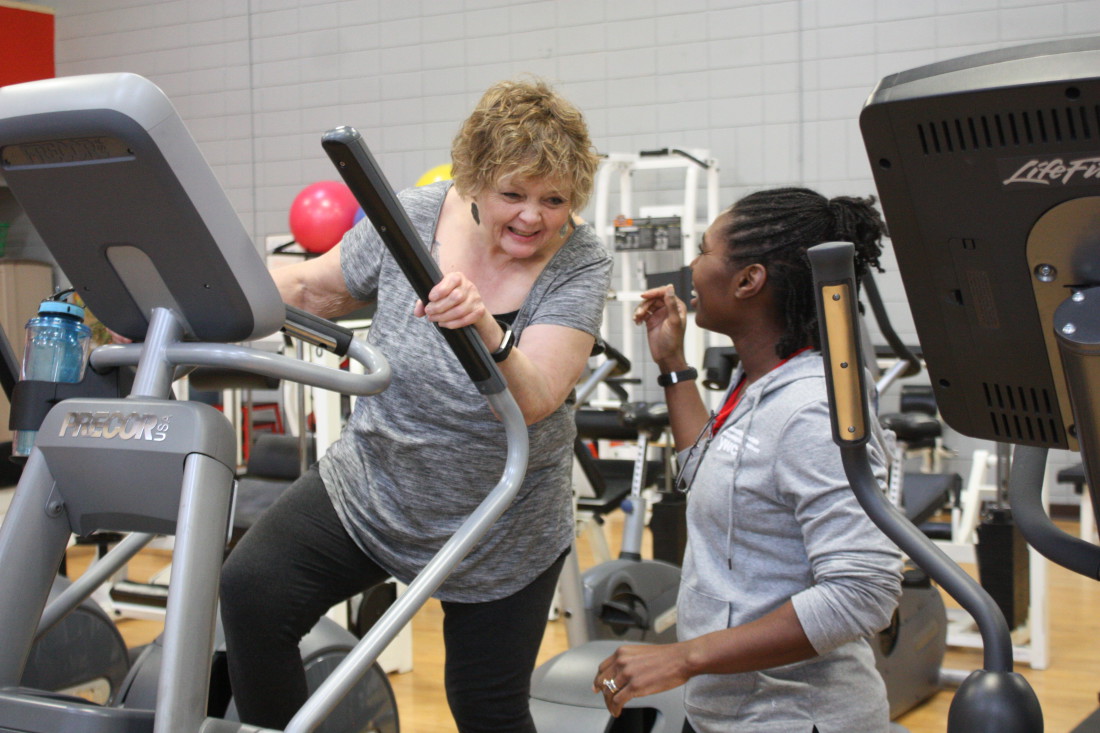Buncombe County, like much of the nation, has a diabetes problem. The disease was ranked as the 10th-leading cause of death in the county in the 2015 Community Health Assessment, an annual gathering of data from residents to determine local wellness in relation to state and national averages. While there are numerous reasons why this has become an epidemic, the assessment found that 23.5 percent of Buncombe adults are obese, and that just over 30 percent of students in K-5 public schools are overweight or obese, factors that increase the incidence of diabetes.
The good news: Asheville-area health professionals say there are affordable and accessible ways to address this growing risk for generations young and old. A wealth of information, diet trends and practices has emerged to address weight loss and the prevention of diabetes.
Christin Banman, a registered dietitian with Mountain Kidney and Hypertension Associates, is accustomed to dealing with the factors that lead to diabetes, Type 2 in particular. “You immediately have to get into the home life situation with these issues,” she says. “Who does the cooking? Who’s in the house?” The majority of her patients have fought weight gain, high blood pressure and long-standing medical issues their entire lives. Their multiple problems create the onset of Type 2 diabetes, she says, which in turn causes kidney malfunction due to higher levels of blood sugar.
Banman’s advice for someone who has contracted the disease and is seeking reversal of the diagnosis is similar to that she’d offer anyone who is prediabetic. She recommends affordable and simple dietary solutions that include buying frozen vegetables for cost and longevity, avoiding most beverages in favor of purchasing foods, buying grains in bulk, and shopping at Aldi and other affordable markets in their area.
Watching your weight is key to help preventing Type 2 diabetes, Banman says. “I really feel like if someone can jump start or hit the restart button with the sugar busters or Atkins diet just to get an initial amount of weight off, I’m a supporter of that. I think the long-term benefits of just getting a little bit of weight off exceed the consequences of that diet.
“I think what we’re dealing with is what’s referred to as a toxic food environment, where we have heavily marketed, very inexpensive, unhealthy foods on every corner — in hospitals, airports and even in our school systems,” she continues. “This food environment surrounds us. So it’s hard for me to argue with someone who says, ‘The croissant sandwiches were two-for-one on the way in.’ With someone that has limited food money, that speaks. So that’s part of the food environment we’re dealing with.”
Diabetes and lifestyle
Type 2 diabetes affects 29.1 million people in the U.S., according to the Centers for Disease Control and Prevention. The most common causes for the onset of this illness are obesity, smoking, physical inactivity, age, family history, high blood pressure and a high alcohol intake, according to WebMD.
Diabetes causes blood glucose levels to rise above normal. When people eat, their bodies turn food into glucose, or sugars, for their body to use as energy. The pancreas creates the hormone insulin, which allows those sugars to get into the cells of the body. But with Type 2 diabetes, the body is no longer able to use its own insulin as well as it should, causing sugar to build up in the blood.

In 2014, the North Carolina State Report named diabetes as the seventh-leading cause of death in the state, the fourth-leading cause for African-Americans and the third-leading cause for American Indians. In WNC, the rate of white people living with the disease is highest, at 11.6 percent, while the rate of African Americans in the eastern part of the state is 15.3 percent.
Harvard University’s PATHS (Providing Access to Healthy Solutions) report for North Carolina in 2014 outlined how legislation could mitigate the disease, including a mandate for insurers to cover diabetes-related services as well as the creation of a unified public health system to provide “whole-person care.” The PATHS report is funded through Together on Diabetes, a philanthropic program of the Bristol-Myers Squibb Foundation, and was launched in 2010 to improve the health outcomes of people living with Type 2 diabetes by strengthening patient self-management education, community-based supportive services and broad-based community mobilization.
Short of legislative measures, how can the millions of Americans seeking to control their weight and improve their health avoid Type 2 diabetes?
Dr. Daniel Stickler of the Apeiron Center for Human Potential in Asheville relates the illness to lifestyle. “Type 2 diabetes is not truly a disease,” he says. “Type 2 diabetes is a lifestyle aspect. You can progress to the point where you actually poison your beta cells in the pancreas after years of being Type 2 diabetic, but it really is a lifestyle. We’ve seen plenty of reversals on people that were diabetic or prediabetic that changed their lifestyle and completely reversed the disease without medication.”
Stickler says that a whole-person approach is needed. Apeiron uses that approach, looking closely at a person’s genetics and at about 75 different genomic variations that help predict appetite, hunger and nutrient selection — from fats to carbs and proteins. Apeiron tailors diets specifically around a person’s genomics, goals and experiences to create a program that is individualized, rather than using a diet from a book.
“The problem that you run into is that when you diagnose someone with a disease, they become the disease,” Stickler says. “The title becomes them, and until they can get to the point where they understand they are not Type 2 diabetes, you’re not going to make any progress with them. We’re treating it with these medications that aren’t treating the core cause, which is lifestyle. It’s OK to bridge that to get things under control, but the whole focus needs to be on treating the core cause, which is a lifestyle component that has created an insulin resistance in the body. And it is easily reversible.
“We have epigenetic coaches that work with clients and read their genetic data, looking at 500 genetic variations and working with sleep, stress, nutrition, exercise and human movement … environment, thoughts, etc. So we’re venturing into all realms in how we address health.”
Ways to approach diet, exercise
Banman notes that Medicare initially covers only three hours a year of dietary intervention and just two hours annually thereafter. “This is where support becomes very limited,” she says, adding that a majority of her patients are diagnosed in their mid-60s, which makes it difficult for them to get up and get moving. In addition, stress from finances, work and family are debilitating factors, pushing diet and exercise to the bottom of their priorities. “I’m struck with the layers in their lives that are making things so complicated, and I’m very sympathetic to it and help however I can,” she says.
Stickler and Banman both recommend the Mediterranean diet, “which is in concert with the diabetic diet,” according to Banman, and which research has consistently shown to be an effective way to also reduce the risk of heart disease, lower low-density lipoproteins (or bad cholesterol) and lower risks associated with cancer, Parkinson’s and Alzheimer’s diseases.
The American Diabetes Association outlines a Mediterranean meal plan on its website. Key components of the diet, according to the Mayo Clinic, are limiting red meat; eating fish at least twice a week and otherwise primarily plant-based food, whole grains and nuts; replacing butter with olive oil; and using herbs and spices instead of salt.

In Buncombe County, residents can address stress, exercise and diet through the Diabetes Wellness and Prevention Program offered by the YWCA, a program designed specifically for adults with or at risk for Type 2 diabetes. Preventive health coordinator Leah Berger-Singer says that participants are given a gym membership, bimonthly personal training, a weekly support group (which discusses health-related topics such as living healthy on a budget) and tips on stress management. “We’re aiming to provide access to people that may not otherwise have access to a gym, cooking classes, swim lessons and other options,” she says. “We also provide monthly dinner lectures or ‘lunch and learns,’ hands-on cooking demos, field trips and other extracurricular activities.”
Chiropractor and yoga instructor J. Anya Harris of Crystalign Chiropractic in Asheville says that stress-reduction techniques coupled with group exercise can be keys to combating many diseases, including diabetes. “Getting out of your routine and your house and away from your cellphone is really important,” she advises. Her approach with patients is to address both spinal health and overall physical health, as well as stress and energy levels. Chiropractic care helps to create a range of motion and mobility, freeing up the body to get patients to the point where they feel good enough to exercise again or continue exercising, she explains. It also opens up the neural pathways that keep the organs, muscles and spine balanced, she adds. “With the energy work, I’m shifting relationships and trauma to give them the spark to get them moving. It’s all about setting up the mind, body and soul to help them feel at ease in their own skin and really define their ‘why.’ If you don’t know your why, then none of it matters, because you won’t stay consistent. The why will give them reframing in their consciousness that will keep them moving toward their goal.”
For more information:
Mountain Kidney & Hypertension, 10 McDowell St., Asheville, offers a variety of services, including diet and meal planning for diabetics and services for those suffering from hypertension and kidney disease. 258-8545
The Apeiron Center for Human Potential, 190 Broadway, focuses on preventive wellness, including genomic assessments, epigenetic coaching and human potential assessments and coaching. (888) 547-1444
Crystalign Chiropractic, 36 Clayton St., off Charlotte Street in Asheville, offers head-to-toe chiropractic adjustments, trigger-point muscle therapy, energy work, nutrition analysis and wellness coaching. 335-2208
The YWCA’s Diabetes Wellness and Prevention Program operates at the YWCA in downtown Asheville, offering a comprehensive diabetes program to prevent or reverse the illness. Preventive health coordinator Leah Berger-Singer can be reached at 254-7206, ext. 212, or Leah.bs@ywcaofasheville.org.



sad how people don’t realize how harmful sugar is to them over the years … it’s deadly with consistent intake.
I know for a fact that diet and exercise will lower those numbers. It’s amazing how getting rid of sugar and carbs can make a huge difference to your health. Here is more information. https://howtocontroldiabeteswithdiet.com/
Coming from a family with diabetes background awareness is out key. We make sure that we exercise regularly and have a healthy diet always. You might love to listen to this podcast http://learntruehealth.com/prediabetes/ very informative.